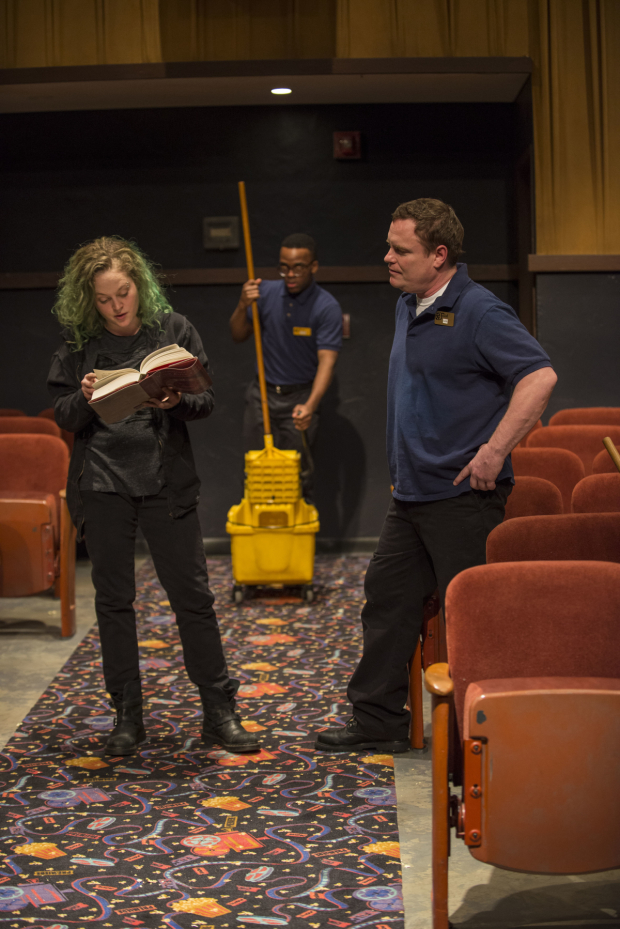The Flick

(© Michael Brosilow)
Annie Baker's 2014 Pulitzer Prize-winning drama The Flick, at Steppenwolf Theatre, is so sparse and slow-moving that is shouldn't logically keep the audience on the edge of its seat with anticipation. Yet it does. Set amid the empty aisles of a faded single-screen movie theater, The Flick allows its action to unfold at an almost maddeningly realistic pace, eschewing dramatically convenient tropes in favor of a presentation of honest, mundane humanity.
Rows of empty seats at a movie theater called the Flick mirror the audience as the play begins, the booth above projecting the flickering lights from one of America's last 35-millimeter projectors. Between movie showings, Sam (Danny McCarthy), a longtime employee, trains new hire Avery (Travis Turner) in the custodial arts. Between popcorn-sweeping tutorials and a lesson on the finer points of soda-spigot cleaning, Sam and Avery make small talk and play occasional games of Six Degrees of Kevin Bacon. They are visited by projectionist Rose (Caroline Neff), and the three dissatisfied employees make mindless conversation as they go about their equally mindless tasks. Sam complains that he's been passed over for a promotion. Avery, a cinephile who is working at the Flick during a semester off from college, laments the ubiquity of digital projection. Outgoing projectionist Rose sleeps off a hangover. The Flick presents these slices of life amid natural silences, sometimes minutes long, allowing its characters' idiosyncrasies and conflicts to play out in real time.
As a playwright, Annie Baker has been lauded for mastering the everyday rhythms of small-town America, and that tone is fully realized in this production. Director Dexter Bullard handles the hyper-naturalistic script with precision, slowly revealing the play's depth. The three principal performers remain pointedly disconnected for much of the play, getting to know one another as the audience gets to know them. As Rose, Neff is truly compelling, showing vulnerability under bravado as Rose navigates her increasingly complex relationships with her coworkers. Turner occasionally comes close to playing Avery as a caricature of neuroses and nerves, reacting with equal agitation to a foul mess in the men's room as he does a positive review of Avatar. But he shines in the more comic moments of this tragicomedy. McCarthy raises empathy as sad-sack Sam, who is being worn down in equal parts by his dead-end job and one-sided crush on Rose, who he is certain is a lesbian.
The Flick would not succeed without an immersive atmosphere. Luckily, Jack Magaw's set is pitch-perfect, right down to the garish popcorn-and-filmstrips patterned carpet running down the aisle. The authenticity of the design allows the audience to feel like a fly on the wall (or really, on the screen) before the play begins. Rob Milburn and Michael Bodeen's sound design is comfortably familiar as well, producing the whirs and hums of an old 35-millimeter projector. Films underscore some scenes — notably, a seduction attempt that fails spectacularly while The Wild Bunch plays.
With a running time of a little over three hours, The Flick may polarize Chicago theatregoers as it did in its original production at Playwrights Horizons in New York. Its utter lack of conventional theatricality requires a Zen-like immersion into the play. But Steppenwolf has crafted an analog production in a digital world that is well worth the patience it requires.











